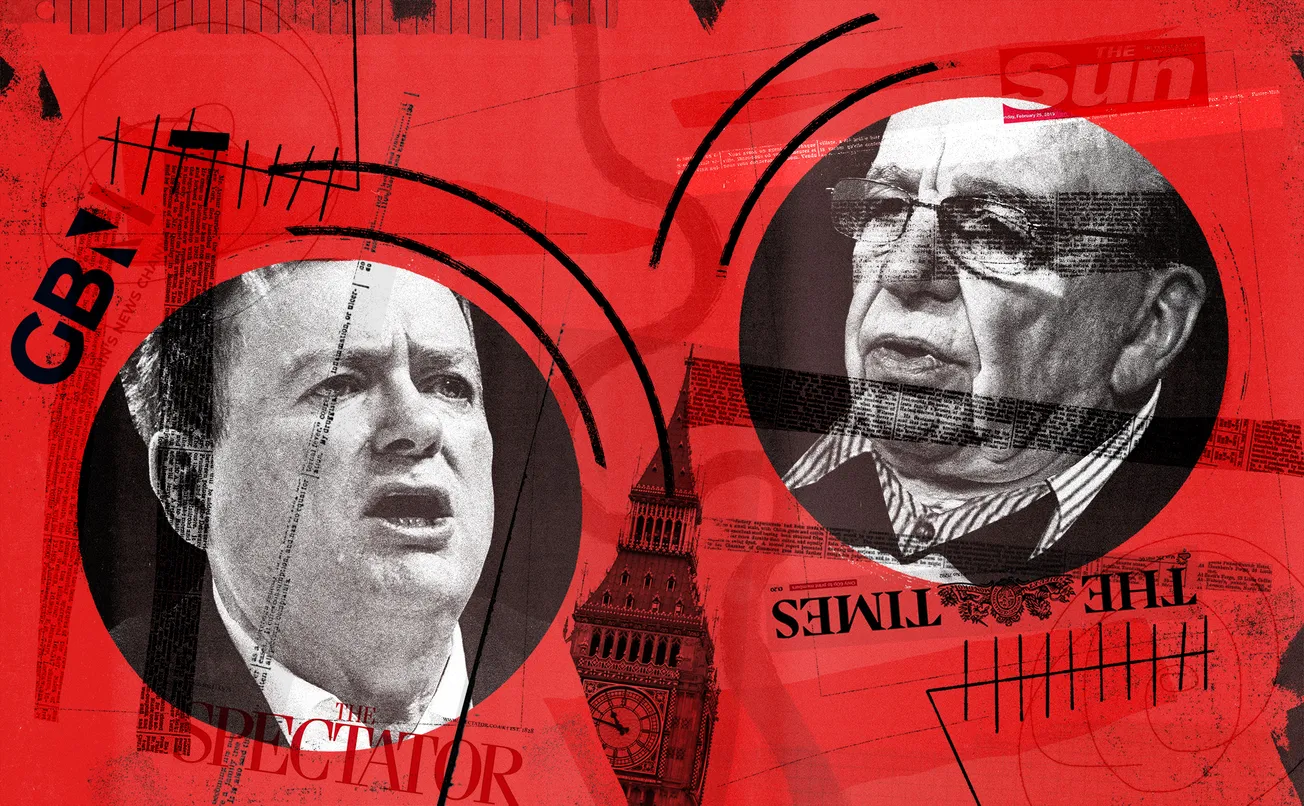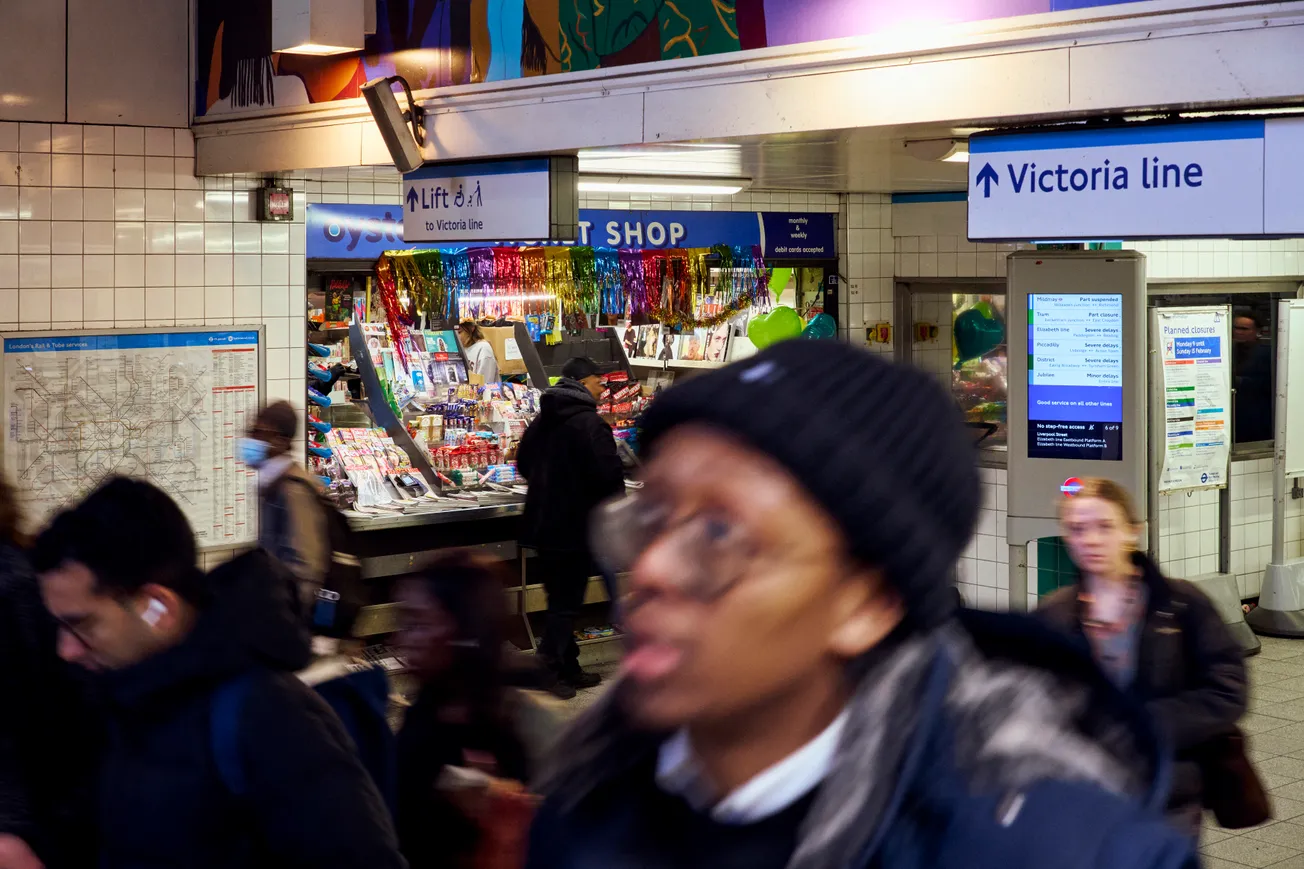This article was published by The Londoner: a new newsletter covering the capital. Join our free mailing list below to get great writing and big scoops in your inbox.
When attendees arrived at the Spectator’s summer party last week, they immediately noticed something different. A longstanding fixture in the Westminster calendar, the event has always been a media love-in — a boozy, gossipy evening attended by cabinet ministers and big-name journalists. But what caught the eye at this year’s event was the sheer amount of caviar on offer.
“The party last night was definitely more lavish,” one hungover guest told me in the morning. Normally, members of the conservative and media elites are packed into the back garden of the right wing media outlet’s Old Queen Street offices, but this year, the party spread into the garden next door, and organisers had laid out “about two kilos of caviar just on the side,” a second guest notes. “It felt like there’s more money kicking around than before.”

That might be because there is more money kicking around the Spectator than before. It comes from the magazine’s new owner Paul Marshall, a wealthy hedge fund manager and major Christian philanthropist who in the past few years has been building up an increasingly noteworthy London media empire: founding the opinion website Unherd, backing the right-wing populist TV network GB News and buying the Spectator last year. In a recent lecture at the University of Oxford, Marshall described himself as an “accidental media owner,” but his media investments aren’t your typical impulse purchases: a reported £100mn to buy the Spectator and well over £50mn to cover the losses at GB News.
(It’s only fair to point out that Freddie Sayers, Marshall’s editorial chief who oversees both Unherd and the Spectator, says the caviar at the party was not paid for by his boss, but “was kindly provided by our sponsor H. Foreman and Son and it was delicious.” Sayers also told The Londoner: “I’m delighted that the mood was felt to be even more glamorous than ever.”)

Marshall describes himself as a committed liberal in the classic mould, and says his foray into media is an attempt to ensure plurality in an ecosystem dominated by both unaccountable tech platforms and the inherently “progressive” BBC, which he sees as “the propaganda arm of the state”.
But to take Marshall at his word and see him as a mere dabbler in the right wing eco-system is to miss the bigger picture. According to Fleet Street Kremlinologists, a much grander scheme is afoot: after five decades of dominance by Rupert Murdoch, Marshall is positioning himself to wrestle the crown from the 94-year-old magnate. “I think Paul does see himself as the heir apparent to the right-wing media,” one senior executive tells me. “It’s been Murdoch’s for a very long time.”
Those in the know describe a power battle between the two men, played out in auctions for venerable news titles and via eye-watering job offers for each other’s journalists. “There is an arms race going on,” one Murdoch employee confirms. “There is a lot of cash flying around.” It takes place at a critical time for the right, as Nigel Farage leads in the polls and threatens to upend UK politics. The kaleidoscope has been shaken and before the pieces settle again, media owners know that they can exercise outsized influence. “They want to choose the next Tory leader. They want to oversee the Tory-Reform merger,” one person who has met both men tells me. “They want to be the power brokers.”
Who is Paul Marshall? “He’s affable, clever,” says John Ryley, the longtime head of Sky News. “He’s an amiable guy. For him, I think it’s a philosophical thing: that the British public hasn’t been sufficiently informed about what’s going on.” Marshall used to be a committed Liberal Democrat, and before that ran for parliament for the SDP-Liberal Alliance in 1987. He left the Lib Dems over Brexit and became a donor to the Leave campaign and then the Tory party.

Is he ideologically conservative these days? “I think it's a bit weirder than that,” one acquaintance of his says. “I think he just doesn’t feel stories are being fully told. That the media is a bit patronising; that the BBC is a bit detached.” Someone who has worked with him says his media investments have the feel of a hedge funder gambling on a shift in the market. “He thinks there is a big change happening in the political media landscape, and he wants to put some bets on the right side of it,” they told The Londoner.
According to a revealing profile published in Prospect magazine last year, Marshall senses that he has been called by God “for such a time as this”, a phrase from the Book of Esther that is popular in the evangelical circles in which Marshall moves, and whose churches he supports financially. He has written for his own website, Unherd, that liberalism in the UK has lost its way by forgetting its Christian roots and embracing bloodless scientific rationalism.
A U-turn in Los Angeles
The past decade in the media has been bleak, with stagnating salaries and rolling newsroom layoffs. But, in the 300-year history of the British press, there has arguably never been a better time to be a well-known Westminster journalist than right now — if your politics skew to the right. Many people won’t warm to the spectacle of extremely rich men with a raft of personal grudges duking it out for media dominance. But the beneficiaries are obvious: a handful of reporters who are now earning vastly more than they ever expected to.
Take Harry Cole, one of the best-known figures in the parliamentary lobby and until very recently the political editor of the Sun. For ten years now, Cole’s political scoops and controversy-grabbing spots on TV have made him one of Murdochland’s top stars, talked about as a future editor of Britain’s biggest selling tabloid.
But in late April, Murdoch’s UK company NewsUK — owners of the Sun, The Times, Times Radio and TalkSport amongst other assets — made a surprise announcement: Cole was leaving Westminster to take on a newly created role in Washington DC. He would now cover, they said, “every twist and turn of the Trump presidency” as editor-at-large for the Sun, as well as contributing to Murdoch’s deeply conservative US outlets, such as the New York Post and FOX News.

How did Cole land this plum job? The answer is another hotly contested battle in the war between Murdoch and the man who seems to have designs on his throne. Speaking to insiders, I learned that Marshall’s GB News tried to poach Cole earlier this year to start their new Washington bureau. Offering Cole a “big package” — said to be hundreds of thousands of dollars — executives at Marshall’s upstart TV channel thought they had landed an audacious coup, stealing away one of Murdoch’s favourites.
That is, until the fightback began. When Murdoch’s UK executives learned about the offer, Cole was put straight on a flight to LA. There he was sent to meet both Rupert Murdoch and his favoured son, Lachlan. It’s impossible to know what inducements the tycoon and his chosen heir offered to Cole — the latter has refused to take my calls this week and NewsUK has chosen not to comment. But, whatever they did worked; as the person who told me the story puts it: “Surprise, surprise, Harry ends up with a fancy new job in Washington for Murdoch.”
How to burn £117 million
The battle for Cole’s services was a mere skirmish, however, in comparison to the initial two rounds of Marshall’s bout with Murdoch. The first was a battle for the airwaves, and Marshall won it handily, throwing millions of pounds at GB News. Meanwhile, its Murdoch-helmed competitor — a channel fronted by Piers Morgan called TalkTV — bombed disastrously, leading Murdoch to pull the plug. “The failure of TalkTV was a great disappointment for him,” says one well-connected figure.
"TalkTV had Piers, and it was very shiny and very American in its look," says former Sky News boss Ryley. But none of that matters without the eyeballs. "The viewers didn’t give a damn". The channel became an expensive burden for NewsUK, partly because of the inflated salaries they had to pay people like Morgan to keep them out of Marshall’s clutches. The commentator Julia Hartley-Brewer is said to have signed a deal to present for GB News until NewsUK “offered her a massive deal” to keep her on TalkTV.

Marshall’s GB News, on the other hand, drew scoffs from commentators for its early technical glitches and amateurish feel, but is now a popular network, sometimes attracting more viewers than the BBC News channel.
Initially, Marshall invested £10mn into GB News, which also received money from Legatum, a Dubai-based investment firm founded by New Zealand-born billionaire Christopher Chandler. Marshall and Chandler pumped in another £34mn into the channel last year, meaning GB News has burned £117mn of their cash since its 2021 launch. That’s a major sum even for someone like Marshall, and GB News executives are said to be under pressure to lure major advertisers to the channel. That might mean airing fewer segments like the one in 2023 in which the channel’s host, controversial culture-war activist Laurence Fox, said of a female journalist: “what self‑respecting man would climb into bed with her?” (Fox was sacked by the network).
Want more high-quality pieces about what's happening in the capital? Sign up to our mailing list to get two totally free editions of The Londoner every week by signing up to our regular mailing list. Just click the button below. No cost. No gimmicks. Just quality local journalism.
Round two of media’s new title fight centred around the Spectator, known as the Tory bible. In the past, Marshall had seemed as though he was trying to compete with the magazine via Unherd, the “heterodox” opinion and analysis website he founded in 2017. He parked his tanks on the Spectator’s lawn by buying the freehold to a property on the same road — Old Queen Street, a five minute walk from parliament — and then opened an Unherd club, where subscribers could attend talks and mingle. His Old Queen Street Café, downstairs from the website’s offices, is now a popular lunch spot for Westminster journalists and their sources.
Summer's officially here — and so is our Londoner summer discount. For just £4.95 a month for your first three months, you can read all our members-only content. That's a nearly 50% saving, meaning you can treat yourself to one more spritz, guilt-free. Act fast though, it can't stay forever.
But last year, his strategy changed — and with it, so did the future of Britain’s right wing media. In October 2023, the Spectator came onto the market after its owners, secretive billionaires the Barclay brothers, buckled under enormous debts, and their media assets, including the Telegraph, were taken into receivership.
Murdoch was known to be keen on buying the magazine, and some inside the building suspected that its longtime editor Fraser Nelson was taking calls from the tycoon during the process.

Murdoch’s bid, said to be £60mn was well over the £40mn valuation given by analysts. But it was blown out of the water by Marshall’s winning offer: £100mn, a staggering sum for a company that typically generates around £20mn in income and less than £3mn in profit each year. Even now, more than six months on from the acquisition, team Murdoch seems sour: “Marshall is so desperate to be invited to the dinner parties that he paid twice what it was worth,” swipes one staffer.
In the aftermath of the deal, one Tory MP told the FT the prospect of Marshall running the Spectator was “appalling” and “terrifying”, summarising the new owner’s agenda as: “destroying the Conservative party and having a new form of Trumpism in the UK”.
Nelson left the Spectator after the sale was announced, moving straight to Murdoch’s paper The Times as a columnist. In his place, Marshall hired former Tory minister and known Murdoch favourite Michael Gove on a sizable salary — and with it, ending speculation that Gove might be offered The Times to edit. But the spending didn’t stop there.
The role of political editor at the Spectator has tended to be a younger journalist on the way up, but Marshall and Gove wanted a marquee hire. After “weeks of haggling”, they got their man: Tim Shipman, the star political writer at Murdoch’s Sunday Times, whose salary is now the subject of a Westminster guessing game. A widely-shared figure of £300,000 is batted away by insiders, but it’s thought to be in the region of £250,000, at least double what the role usually pays.

“A lot of people are thinking ‘That’s a lot more than we’re being paid,’” says a junior Spectator writer, although they concede that Shipman’s extensive contact book is already delivering good stories for the magazine, including details of attorney general’s advice to the prime minister over joining the US military action in Iran.
Meanwhile, over at The Times, Nelson seems to be getting the old band back together. Since Marshall bought the Spectator, The Times has hired not just Nelson and his former Spectator political editor Katy Balls, but also former Spectator writer Cindy Yu. Andrew Neil, the Spectator’s former chairman, is now the star of Murdoch’s Times Radio.
Nelson writes a column for the newspaper (his politics and faith in free markets are solidly Murdochian) but insiders note that he is a lot more present in the building than most columnists are. “Fraser has basically been turning up, going to conference every day, taking notes,” a journalist at The Times tells me. The word on the street (or at least, in the Baby Shard, where NewsUK is based) is that Nelson is the “shadow editor” of The Times — and that he fancies the job for real.
"I think Fraser is livid," one friend of his told The Londoner, referring to Marshall's takeover of Nelson's beloved Spectator. "And he’s a very determined bloke."
The power play
Marshall’s assault on the Murdoch citadel may sound familiar to readers who remember similar media clashes in the past, including Murdoch’s rivalries with the former Mirror owner Robert Maxwell and the Telegraph’s former proprietor Conrad Black. What are these battles all about? “It’s about the power,” answers top media watcher Jane Martinson, whose book You May Never See Us Again chronicles the rise and fall of the Barclay brothers, previous owners of the Telegraph.
“The prize is political influence,” Martinson tells me. “You don’t own these companies to make much money.” The obituary for the press has been written many times, but newspapers are still influential in how they shape what gets said online and on TV and radio, she says. “The influence that comes from media organisations and the way they can frame the news is still really important.”
Martinson thinks Marshall “has the upper hand on Murdoch” when it comes to TV, but everyone I speak to wonders about the future of The Times, which is still a major institution in British public life. Murdoch has owned it for decades, but it’s unclear whether his son Lachlan would want to keep it after his eventual demise. In his Oxford lecture, Marshall talked about his admiration for the newspaper, which he read on the way to work as a young finance worker because its wide range of opinion columns helped him to challenge his biases. A new owner for The Times would “shift the tectonic plates of British media,” says Ryley.

What about online? Unlike in the US, where freewheeling independent podcasters like Joe Rogan dominate the digital sphere, the UK’s new media offerings still feel conventional: the country’s biggest political podcast, The Rest is Politics, is hosted by former New Labour spin doctor Alastair Campbell and the ex-Tory minister Rory Stewart, neither of whom is inclined to veer off on tangents about reverse-engineering UFOs at clandestine military sites, as sometimes happens on Rogan's show. Marshall’s Unherd has managed to key into the online discourse better than most of the legacy media (a recent video discussion on YouTube asked: “Is civil war coming to Britain?”), but neither Murdoch nor his new rival have yet cracked how to appeal to younger audiences in an era of influencers and short-form video.
For now, the prize for Marshall and Murdoch is in Westminster, where everyone is watching the slugging match on the right of politics, as Kemi Badenoch’s Tories fight against irrelevance while Farage’s Reform UK are riding high in the polls. People noticed that Team Farage were all invited to Murdoch’s highly selective summer party – one Londoner source spotted Reform's Treasurer Nick Candy, its deputy leader Richard Tice and its "Doge unit" head Zia Yousuf at the event. And there is talk that the Sun could even back Reform.
Marshall’s GB News is the most Farage-friendly outlet in the country – the Reform leader hosts a prime time show on the network – and via Gove and the Spectator, he will now play a major part in the Conservative party psychodrama too. A growing media empire gives him unusual influence in a moment of flux — the kind of influence Murdoch has enjoyed for half a century.
That influence has cost Paul Marshall hundreds of millions of pounds. But beyond the caviar and the massive salaries, the unanswered question is how he plans to wield it.
Craving more media reads from The Londoner? Try our long read about a Labour advisor's dubious book about London, and our report revealing the questionable origins of the incessant newspaper reports about rich people leaving the capital. Also, this week we published a great scoop about the collapse of the government's expensive plan to house London's homeless.
Welcome to The Londoner. We’re the capital’s new magazine, delivered entirely by email. Sign up to our mailing list and get two totally free editions of The Londoner every week: a Monday briefing, full of everything you need to know about that’s going on in the city; and an in-depth weekend piece like the one you're currently reading.
No ads, no gimmicks: just click the button below and get our unique brand of local journalism straight to your inbox.
Unlike the outlets at the centre of this story, we aren't backed by billionaire media moguls. Instead, we're funded by our members, the people who believe that London's media should be high-quality, in-depth and beholden only to its readers. If you agree with that, then consider becoming a backer of The Londoner with our summer discount — just £4.95 a month for your first three months.







